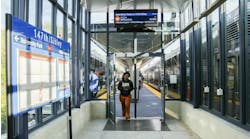SEPTA's KOP rail project enters project development phase in FTA's CIG program
The Southeastern Pennsylvania Transportation Authority's (SEPTA) King of Prussia Rail (KOP Rail) project received approval from the Federal Transit Administration (FTA) to enter into the project development phase under the FTA's Capital Investment Grant (CIG) program.
Acceptance into the project development phase follows FTA's adoption of a combined Final Environmental Impact Statement/Record of Decision, which allowed SEPTA to continue the design and construction of the four-mile extension of the existing Norristown High Speed Line (NHSL) into King of Prussia. SEPTA notes this is a critical milestone in seeking federal funding support and provides the opportunity for continued coordination with the FTA.
The CIG program appropriates funds for light, heavy and commuter rail projects, streetcar and bus rapid transit projects. New Starts provides approximately $2.3 billion per year in federal funding to transit projects across the United States, including extensions to existing systems like the NHSL.
The KOP Rail project will provide a high-speed, one-seat ride for passengers traveling to King of Prussia, Philadelphia, Norristown and other destinations in Montgomery and Delaware Counties in Pennsylvania. This extension gives workers, shoppers, students and visitors convenient and reliable access between Center City, University City and King of Prussia – the region's three largest employment centers – in 45 minutes.
"The KOP Rail project is necessary to support evolving needs and develop a 21st century transportation solution for the region," said SEPTA General Manager and CEO Leslie S. Richards.
KOP Rail is a key component of SEPTA Forward, SEPTA's Strategic Plan, which focuses on increased connectivity, access, and equity. Together with other SEPTA Forward initiatives, such as Trolley Modernization and Bus Revolution, it promotes and strengthens regional growth, and connects people with opportunity.
During this stage of the project, SEPTA is focused on evaluating program delivery options and completing 30 percent design of the infrastructure.
"Over the last several years, SEPTA has invested in the technical planning, environmental analysis, public outreach, and initial technical work necessary to make this phase successful," said SEPTA Assistant General Manager of Planning Jody Holton. "We will continue to work closely with the local communities and stakeholders as the design progresses on this critical project."


